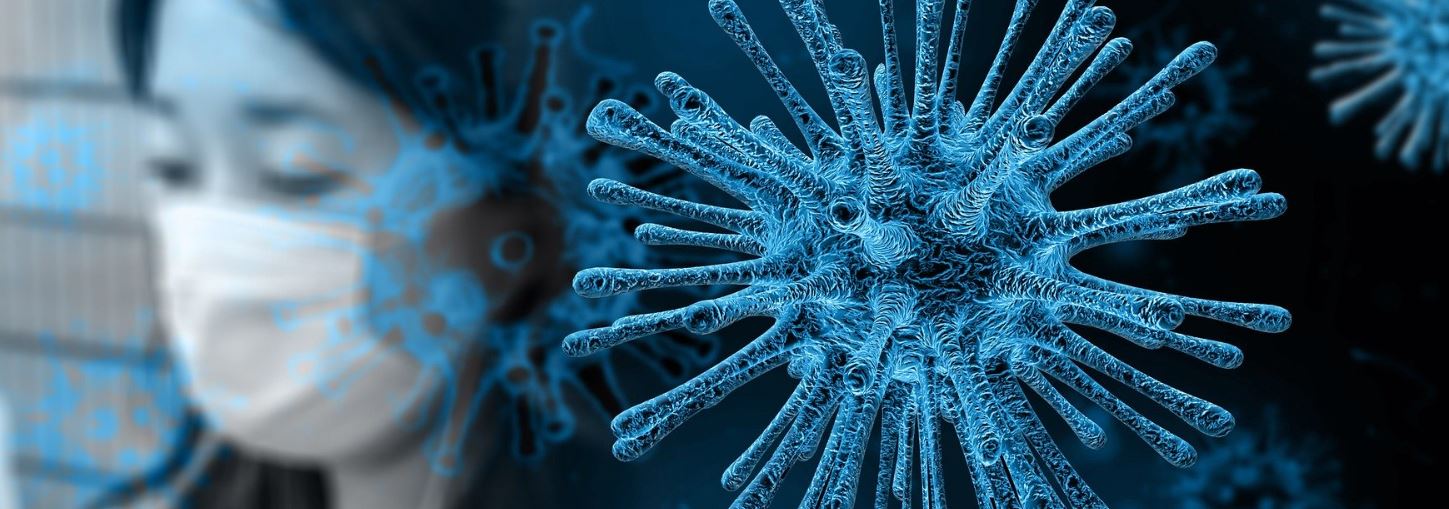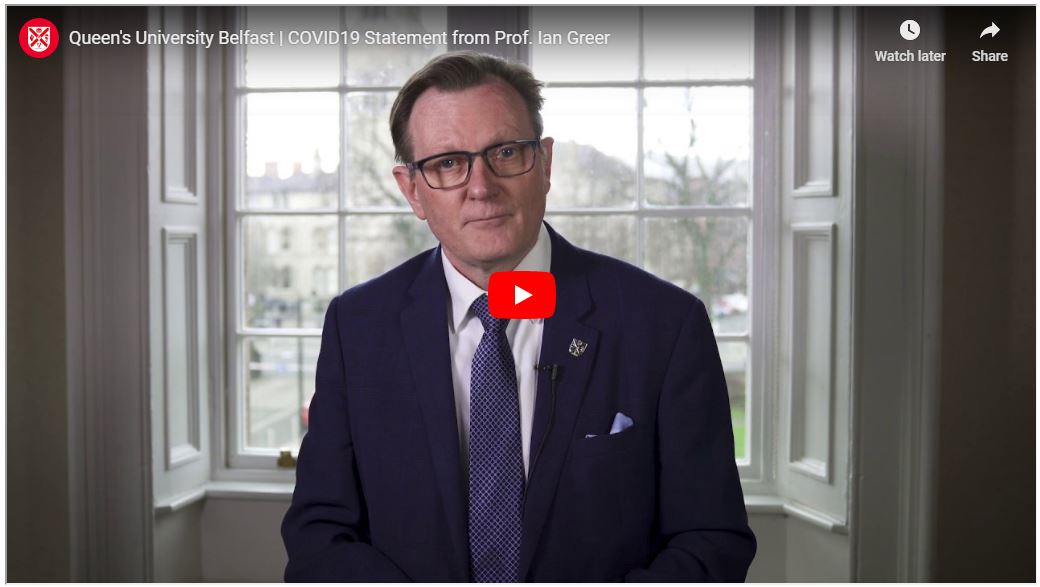QUEEN'S PLAYING ITS PART LOCALLY, NATIONALLY AND GLOBALLY IN FIGHT AGAINST COVID-19

03 April 2020
During a period when seismic changes around the world impacted everyone, affecting how we live and how we work, Queen’s has been taking unprecedented steps to protect its students and staff – and to reach out to its graduates, supporters and the wider community – while playing its part locally, nationally and globally in the fight against COVID-19.
From Professor Ultan Power's work repurposing existing drugs as potential anti-viral therapeutics, to 3D printing of visors to protect Northern Ireland's healthcare workers, researchers at Queen’s are at the heart of supporting global efforts to understand the Coronavirus (COVID-19).
Speaking recently by video to the wider Queen's family, President and Vice-Chancellor Professor Ian Greer spoke about the difficulties posed by the rapidly changing situation. He said: "Our response evolves on a daily basis to meet the needs of our people and to protect the safety and wellbeing of our community.
"At Queen's, we have a leadership role to play in tackling the challenges posed by this pandemic. From using our research expertise to advance the science that tackles COVID-19, to supporting those sectors of our ecoomy that will be widely impacted," he added.

As we advance our knowledge of the global challenges presented by the virus, the University has been keeping students, staff and the public updated on how Queen’s is leading new research projects to address COVID-19; supporting local, national and international efforts to expand our knowledge of the pandemic; and deploying this enhanced intelligence to develop solutions that will benefit our society here in Northern Ireland, across the UK and globally.
Partnerships
Working closely as a Queen’s community and in partnership with health and social care agencies, the University is striving to ensure that staff, students and the people of Northern Ireland are protected as much as possible during this crisis.
“There is a lot of uncertainty around at the moment, but can I reassure you that in the University, we are working hard to look after our students and staff, and the wider community” said Stuart Elborn, Pro Vice-Chancellor of the Faculty of Medicine, Health and Life Sciences.
In line with advice from the UK Government, Queen’s has transitioned to a working from home model where possible and all forms of face-to-face teaching have ceased until further notice.
“While the pandemic has been a harrowing experience for us all, it has also united us as a community. It is only by working together that we can preserve the health, wellbeing and social fabric of our society,” said Professor Mark Lawler, Associate Pro Vice-Chancellor from Queen’s Faculty of Medicine Health and Life Sciences.
Supporting staff and students with the latest online advice the University’s website serves as a valuable resource for information on COVID-19 research and related activities.
“We are providing a distinctive forum for authoritative discourse and debate on the challenges that we face and how Queen’s researchers are responding to these challenges for the benefit of society,” added Professor Lawler
“We recognise how the COVID-19 pandemic is disrupting the very fabric of how we function as a society.
“Recognising this new reality, our research expertise in domains including health and life sciences, secure connected intelligence, economic, legal, ethical, psychological and social sciences is being brought to bear to help deliver robust solutions for the one of the greatest challenges that this planet has faced in the last 100 years.
“Queen’s is stepping up to its social responsibility to provide as much support and help as we can to our community here in Northern Ireland,” he concluded.
Social modelling
The University continues to work with the Public Health Agency, the Health and Social Care Trusts and other stakeholders to help delay the spread of this infection and mitigate the consequences. “We want to ensure that people in Northern Ireland have the right facilities to have the diagnosis made, where appropriate, and to have the right treatment,” said Professor Elborn.
University health experts, led by Professor Frank Kee, are conducting social modelling to capture the complex interaction between disease occurrence and social responses to provide insights that may help policymakers respond to the pandemic.
“Our Public Health team are doing some modelling on how we might manage the situation in terms of the whole population,” continued Professor Elborn.
“They are moving some of their academic activity to help support Public Health interventions that will help us manage the consequences of COVID-19 in Northern Ireland and these islands.”
Members of the University’s world-class virology team are now applying their expertise to helping with understanding COVID-19, consulting with leading coronavirus experts in the University of Iowa and at the National Biotech Centre’s Coronavirus Lab in Madrid.
“We are shifting our research to see if we can make a contribution to helping us understand why this virus is so easily spread, how it causes the damage, particularly to older people with multimorbidity, and to explore ways in which this viral infection might be treated better either through a medication or, more long-term, through a vaccination,” said Professor Elborn.
Further information
Details of the University’s overall response to COVID-19, including the latest search for a cure, can be found here: https://www.qub.ac.uk/coronavirus/
In addition to online lectures and workshops, the University is also supporting students, graduates and the wider community through a range of other extracurricular activies, including workout classes, online quizzes and volunteering opportunities.
And a selection of media articles featuring commentary and analysis from Queen’s research staff – can be found here: http://www.qub.ac.uk/coronavirus/media-analysis/
COVID-19 rapid response innovation fund
Your support will help our work to produce innovative protective equipment for healthcare workers as well as using simulation-based training to equip our students in the healthcare professions with the skills and confidence required for their early entry into the mainline workforce.
If you would like to find out how you can support the University in its efforts to tackle the COVID-19 pandemic, click here.
Queen’s Development and Alumni Relations Office will endeavour to remain in contact with graduates and donors, and to support online networking initiatives, to keep alumni and supporters connected.
Media enquiries about this story can be sent to comms.officer@qub.ac.uk at Queen’s University Belfast.
Back to Main News
Top of Page